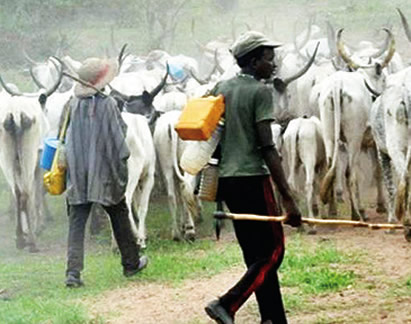Bloody clashes between farmers and herdsmen are primarily caused by the influx of foreign herders, the absence of grazing routes, cattle rustlings and the marginalisation of Fulani herdsmen in the political affairs of their host communities.
A lecturer in the department of geography, University of Abuja, Dr Nenadi Oluyori, who stated this while speaking at a policy roundtable supported by Rosa Luxemburg Foundation West Africa on a book, ‘The root cause of farmers-herders crisis in North Central Nigeria’ in Abuja, blamed latent factors that include scarcity of economic resources associated with the population explosion of both human and animal population, poverty, weak security, and deeply entrenched ethnic animosity between the farmers and herders as other factors driving the killings.
Critiquing the book, Dr Oluyori maintained that the background of the study is not adequate, saying the overview should have been from the global view, Africa, Nigeria before narrowing down to the north central zone.
She added: “Fulani herders are destroying the farmers’ crops due to lack of grazing routes because of farmers cultivating every available space, rustling of cows, intolerance, impatience, aggressiveness from both sides, the influx of external herders, the marginalization of the Fulani herders in the political affairs of the communities and the implementation of the anti-grazing law in Benue state amongst many factors.”
Dr Olowu Olagunju of the Political Science department, University of Abuja, who flayed the reactionary approach that has been deployed to tackle the crisis, urged the government to raise legislation to change the indigene-citizens divide in Nigeria, protect the vulnerable communities from attacks and counter-attacks that are associated with farmers-herders crisis and adopt livestock transformation plan as a solution to open grazing.
He added: “There is a need for state governments to mediate and put measures to immediately address the issue, collaborate with traditional rulers and community leaders, and resolve the issue of distrust and animosity and lack of peaceful co-existence.”
He noted that herders’ farmers’ clashes have led to the loss of lives and economic goods such as food crops and cattle leading to food insecurity in many communities while it has equally led to fear of insecurity among ordinary citizens thus hampering social, economic, and political activities.
Dr Olagunju further stressed that the response to distress calls by security agents, whenever the community was under attack, has further encouraged the bloodshed.
“Evidence abounds on how security forces ignored warning calls of an impending attack or blatant refusal to protect communities under attack. The lack of political will by the government is one of the reasons fuelling the crisis. The political will to arrest and punish the offenders adequately is also a motivating factor for continued attacks in Nigeria,” he added.
Source: Guardian





